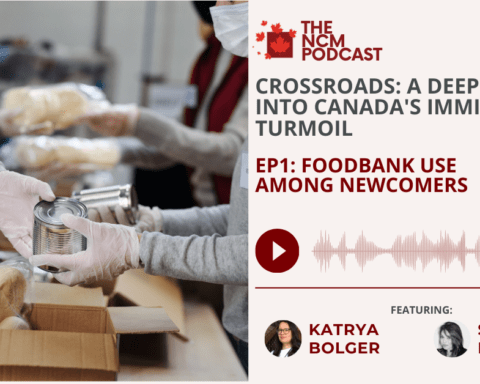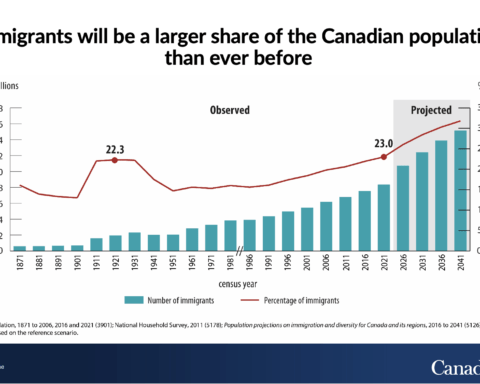The Canadian population is currently well north of 40 million, growing by over one million between the summer of 2022 and 2023, which has been significantly aided by the large number of immigration programs and pathways. Like with most initiatives that attempt to strengthen our rapidly changing socio-economic landscape, new found solutions and implementations will always have their fair share of constructive criticism. However, sometimes it’s good to take a step back and realize that the multitude of immigration programs that currently exist sometimes go under-appreciated, although they allow families to re-unite and individuals are provided with more opportunities to experience Canadian culture and settle here permanently.
The most common economic immigration pathway available to new immigrants to obtain their Permanent Residency in Canada is through the Express Entry system, first started in January, 2015. At the peak of the COVID-19 Pandemic, the Express Entry system issued more than 114,431 Invitations To Apply, to candidates seeking Permanent Residency in 2021. It was a surprising number considering the closed borders and limited travel. Those candidates came almost entirely from individuals already in the country that were working towards improving their chances of being Invited To Apply for Permanent Residency by gaining Canadian educational qualifications and obtaining Canadian work experience. It illustrated that while Canada is one of the most attractive destinations in the world from individuals that are still on the outside looking in, there is also significant interest from potential candidates that have experienced our culture and quality of life and wish to call Canada home permanently. It is not a surprise then, that we have seen record-breaking immigration numbers year-over-year, from a bit of a dip of 226,309 in 2020 when the Pandemic had just begun, to a sharp increase to 492,984 in 2021, and 437,180 in 2022, and with a goal of inviting up to 505,000 additional Permanent Residents in 2023.
To reach these numbers, Immigration, Refugees and Citizenship Canada (IRCC) has made some notable changes to the Express Entry system, by introducing targeted occupation-specific draws such as individuals in agriculture and agri-food – candidates working as agriculture service contractors, farm supervisors, and retail and wholesale butchers, with a minimum CRS score of 354 as of the draw on September 28, 2023. Additional recent draws have also focused on newcomers with transport experience such as commercial truck drivers, pilots, and aircraft assembly workers, with a recent September 20, 2023 draw minimum CRS score of 435 and the recent Federal Skilled Trades draw on August 3, 2023, with a minimum CRS score of 388. The advantages to these occupation-specific draws are the greater ability to meet the eligibility requirements and the chances of receiving an Invitation To Apply, which are now higher for individuals in these in-demand occupations without them necessarily being compared to individuals who have professional degrees and work experience. The increase in professional candidates have affected the Canadian Experience Class pathway of the Express Entry system, contributing to recent all-program draws sharply increasing to CRS scores north of 500, a number significantly higher than the minimum CRS scores needed pre-COVID 19, where a general range of 438 to 475 was commonly accepted.
These new implementations to the system allow for pathways to be more tailor-made to suit the realistic circumstances that candidates in other occupations are in, as they are extremely valuable to our economy, our quality of life as a society, and most importantly, deserve to have their skills and qualifications highlighted in a way that will provide them with better opportunities to be able to permanently reside in Canada.
Outside of the Express Entry system, the different Sponsorship programs are another common pathway for candidates that wish to re-unite their families in Canada permanently. Earlier this year, IRCC has implemented key public policies to aid Spousal Sponsorships, allowing the applicants the opportunity to apply for a work permit so they can work in Canada while their application is being processed. This policy was previously only available to candidates that were eligible for Inland applications. However, Canadian immigration has rightly responded to the criticism they received, as there are candidates that are mostly residing in Canada but need to travel in and out of Canada to attend to family matters at home, making them realistically only able to apply for the Outland pathway. These new public policies allow for these candidates to have the choice to pick the pathway that is more suitable to them without necessarily sacrificing their ability to work in Canada. In addition, these new Temporary Resident Visa and Work Permit options for Spousal Sponsorships have also been given priority, as the applications processing times are expedited.
Nevertheless, there is valid constructive criticism of Canadian immigration and their pathways, programs, and processing times. The criticism is an essential part of the process as well, as they allow IRCC to actively streamline and improve their pathways and programs by understanding the issues real newcomers are facing. However, with several different avenues to immigration already existing, sometimes a suitable program may already exist but has not been given as much of a spotlight.
For specific or detailed information on individual options or programs, you may contact the author, Pranay Chaudhry, at 416-880-1539 (cell) or by email at chaudhrypranay@gmail.com.
Pranay Chaudhry is an immigration lawyer at JC Law Professional Corporation. He has a law degree from University of London, UK, and he also holds a Masters in Law from SUNY University at Buffalo, New York, USA. He is also a Canadian lawyer licensed to practice in Ontario, Canada. He is a member in good standing with the Law Society of Ontario.
Disclaimer: Please note that this article does not constitute legal advice nor is a lawyer-client relationship formed until an individual retainer agreement is signed with the lawyer.

Pranay Chaudhry
Pranay Chaudhry is an immigration lawyer at JC Law Professional Corporation. He has a law degree from University of London, UK, and he also holds a Masters in Law from SUNY University at Buffalo, New York, USA. He is also a Canadian lawyer licensed to practice in Ontario, Canada. He is a member in good standing with the Law Society of Ontario.




